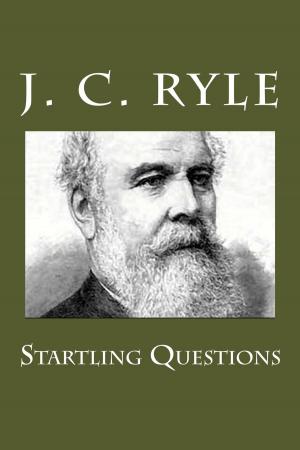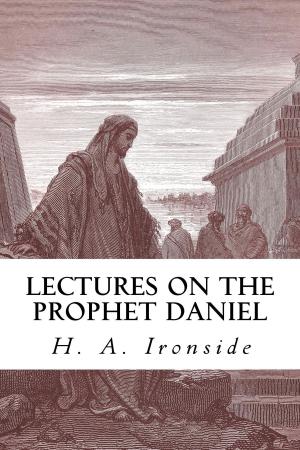Addresses on the First and Second Epistles of Timothy Titus and Philemon
Nonfiction, Religion & Spirituality, Christianity, Christian Literature, Bible & Bible Studies, New Testament, Commentaries| Author: | H. A. Ironside | ISBN: | 1230001945713 |
| Publisher: | CrossReach Publications | Publication: | October 1, 2017 |
| Imprint: | Language: | English |
| Author: | H. A. Ironside |
| ISBN: | 1230001945713 |
| Publisher: | CrossReach Publications |
| Publication: | October 1, 2017 |
| Imprint: | |
| Language: | English |
There are three letters of Paul which we generally speak of as Pastoral Epistles: 1 and 2 Timothy, and Titus. They are so-called because they were written to servants of Christ who, in a very special sense, had the care of God’s people in different places. These two young men had been converted through the instrumentality of the apostle Paul and had gone out to preach the Word in association with him. From time to time he left one or the other to help in various newly-formed churches in order that the young converts might be established in the truth. Both of these young men had a shepherd’s heart and delighted to care for the sheep and lambs of Christ’s flock. In these three letters Paul writes to them regarding certain things which, as pastors, or shepherds of the flock, they needed to keep in mind. Of course, they are not only for those who have special gifts along these lines, but they also contain instruction for all God’s people.
T
HERE are three letters of Paul which we generally speak of as Pastoral Epistles: 1 and 2 Timothy, and Titus. They are so-called because they were written to servants of Christ who, in a very special sense, had the care of God’s people in different places. These two young men had been converted through the instrumentality of the apostle Paul and had gone out to preach the Word in association with him. From time to time he left one or the other to help in various newly-formed churches in order that the young converts might be established in the truth. Both of these young men had a shepherd’s heart and delighted to care for the sheep and lambs of Christ’s flock. In these three letters Paul writes to them regarding certain things which, as pastors, or shepherds of the flock, they needed to keep in mind. Of course, they are not only for those who have special gifts along these lines, but they also contain instruction for all God’s people.
It has been well said that the Letter from Paul to his friend Philemon is the finest specimen of early, personal, Christian correspondence extant. It was written to commend a returning, runaway, thieving slave to his master. With characteristic generosity and a deep sense of the importance of maintaining a standard of righteousness, Paul offers to be surety for this man, Onesimus, and agrees to meet every responsibility as to his past evil-doing. He knew that the life of Onesimus had been changed completely by divine grace, and so he unhesitatingly requested Philemon to receive him, no longer as a slave but as a brother in Christ.
There are three letters of Paul which we generally speak of as Pastoral Epistles: 1 and 2 Timothy, and Titus. They are so-called because they were written to servants of Christ who, in a very special sense, had the care of God’s people in different places. These two young men had been converted through the instrumentality of the apostle Paul and had gone out to preach the Word in association with him. From time to time he left one or the other to help in various newly-formed churches in order that the young converts might be established in the truth. Both of these young men had a shepherd’s heart and delighted to care for the sheep and lambs of Christ’s flock. In these three letters Paul writes to them regarding certain things which, as pastors, or shepherds of the flock, they needed to keep in mind. Of course, they are not only for those who have special gifts along these lines, but they also contain instruction for all God’s people.
T
HERE are three letters of Paul which we generally speak of as Pastoral Epistles: 1 and 2 Timothy, and Titus. They are so-called because they were written to servants of Christ who, in a very special sense, had the care of God’s people in different places. These two young men had been converted through the instrumentality of the apostle Paul and had gone out to preach the Word in association with him. From time to time he left one or the other to help in various newly-formed churches in order that the young converts might be established in the truth. Both of these young men had a shepherd’s heart and delighted to care for the sheep and lambs of Christ’s flock. In these three letters Paul writes to them regarding certain things which, as pastors, or shepherds of the flock, they needed to keep in mind. Of course, they are not only for those who have special gifts along these lines, but they also contain instruction for all God’s people.
It has been well said that the Letter from Paul to his friend Philemon is the finest specimen of early, personal, Christian correspondence extant. It was written to commend a returning, runaway, thieving slave to his master. With characteristic generosity and a deep sense of the importance of maintaining a standard of righteousness, Paul offers to be surety for this man, Onesimus, and agrees to meet every responsibility as to his past evil-doing. He knew that the life of Onesimus had been changed completely by divine grace, and so he unhesitatingly requested Philemon to receive him, no longer as a slave but as a brother in Christ.















